译林版(2020) 必修第三册 Unit 2 Natural Disasters 单元复习课件(72张)
文档属性
| 名称 | 译林版(2020) 必修第三册 Unit 2 Natural Disasters 单元复习课件(72张) | 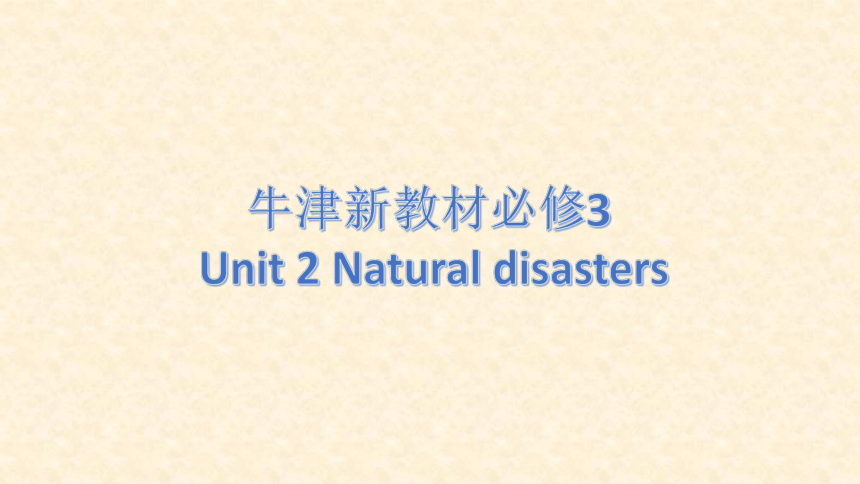 | |
| 格式 | pptx | ||
| 文件大小 | 871.4KB | ||
| 资源类型 | 教案 | ||
| 版本资源 | 牛津译林版(2019) | ||
| 科目 | 英语 | ||
| 更新时间 | 2022-09-13 10:19:42 | ||
图片预览

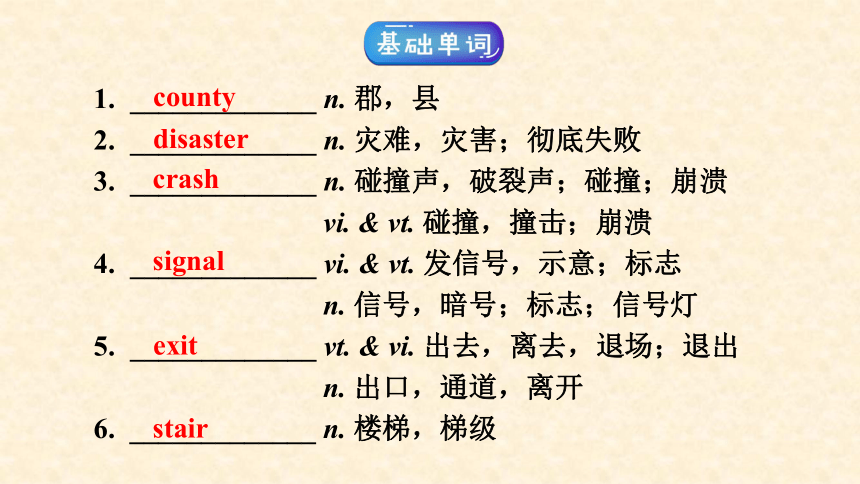
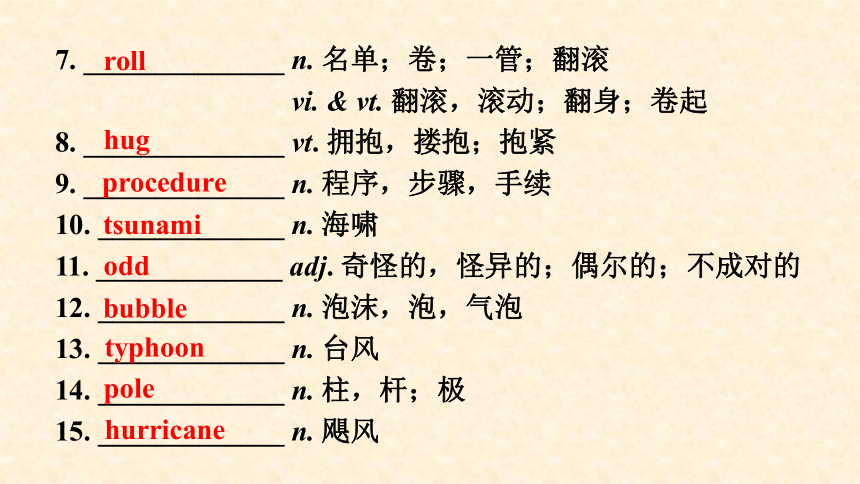
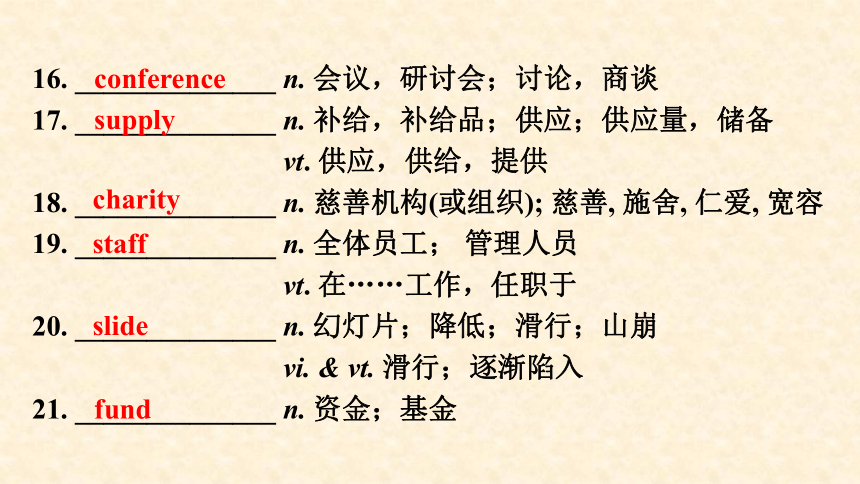
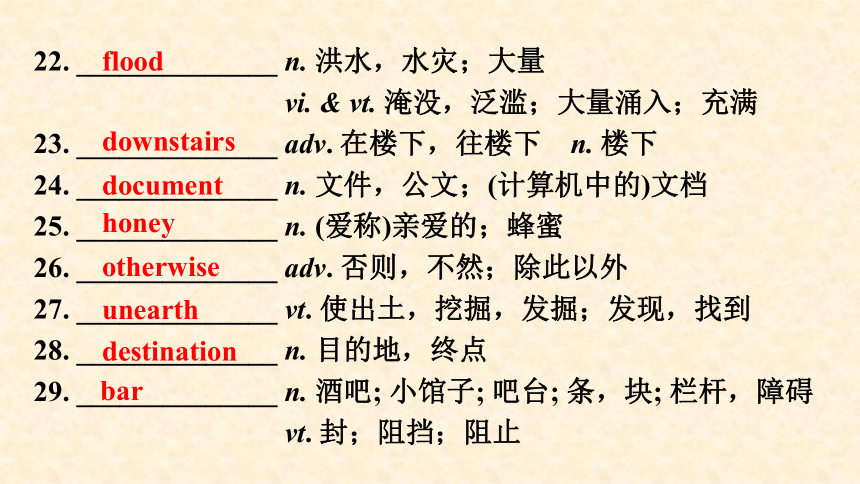
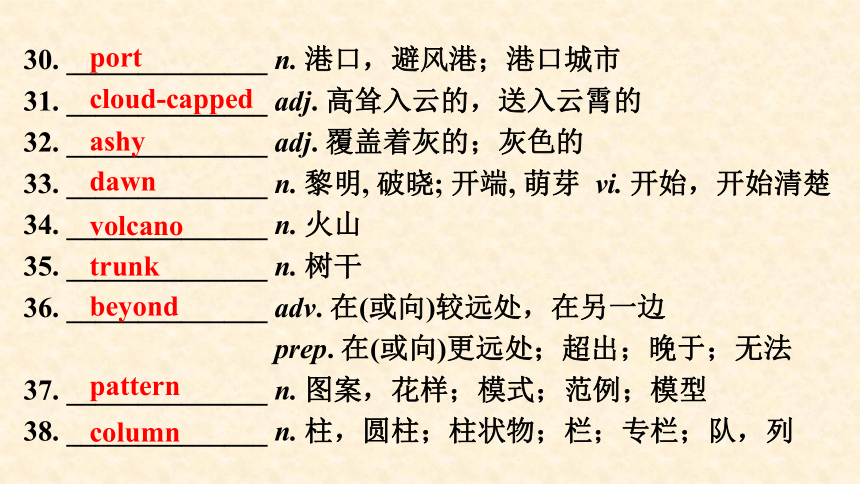
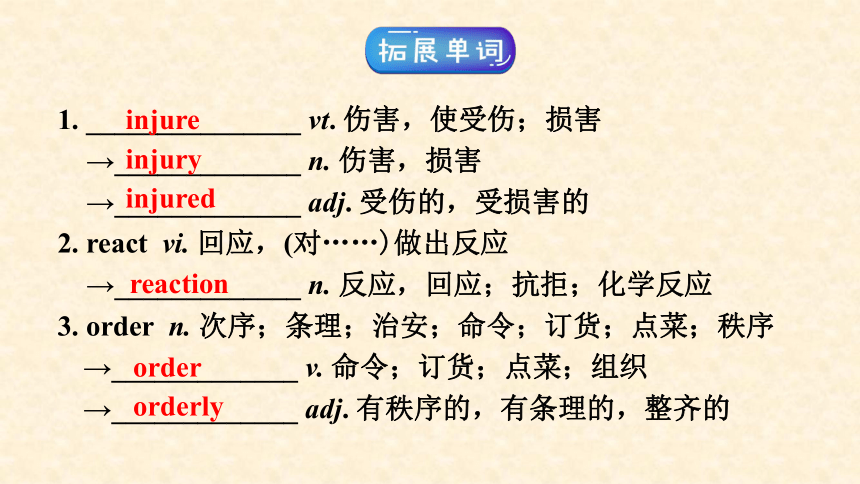
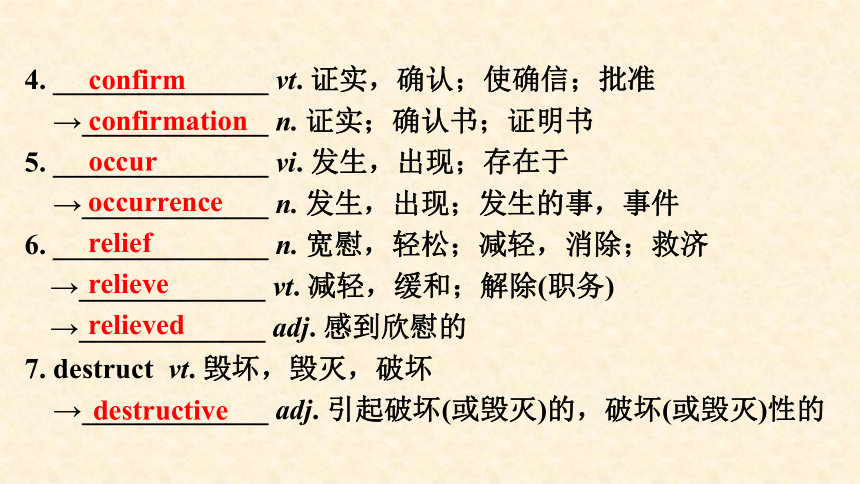
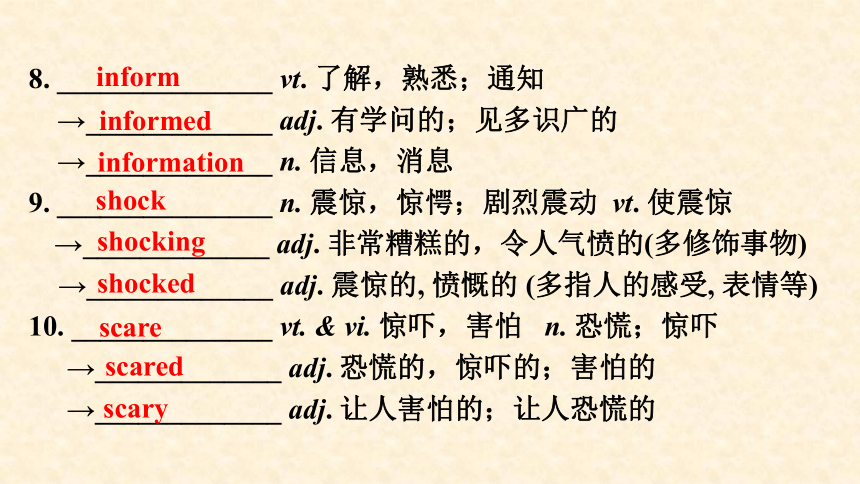
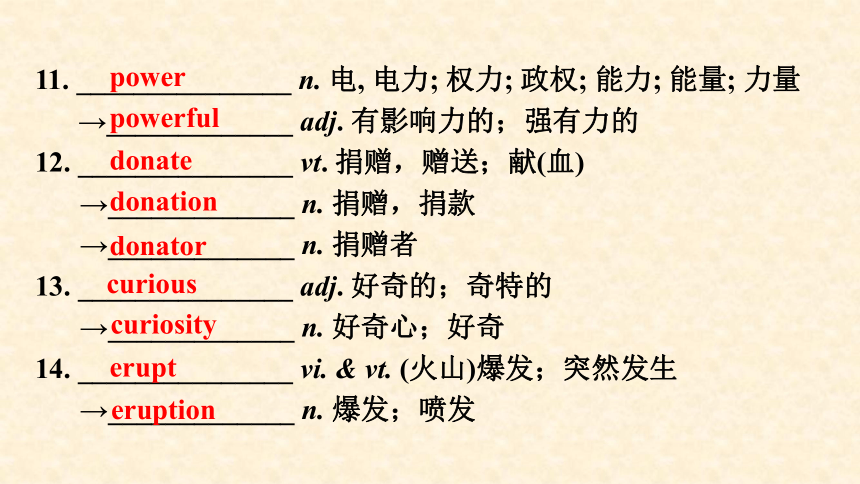
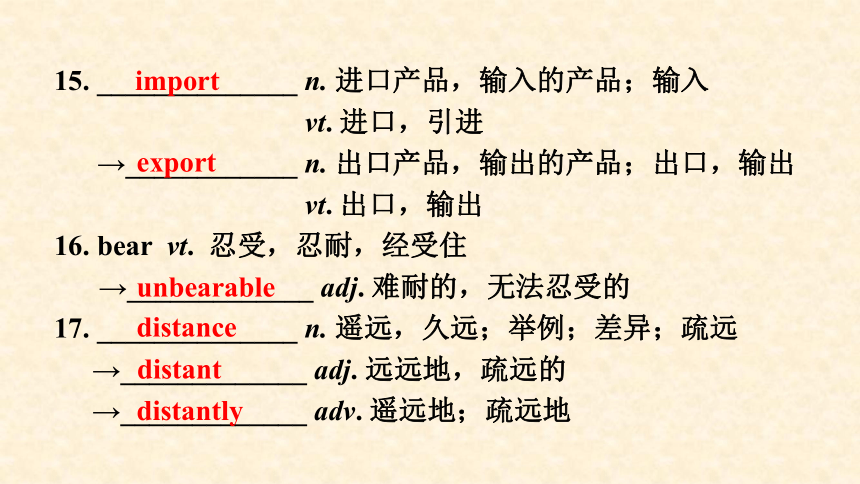
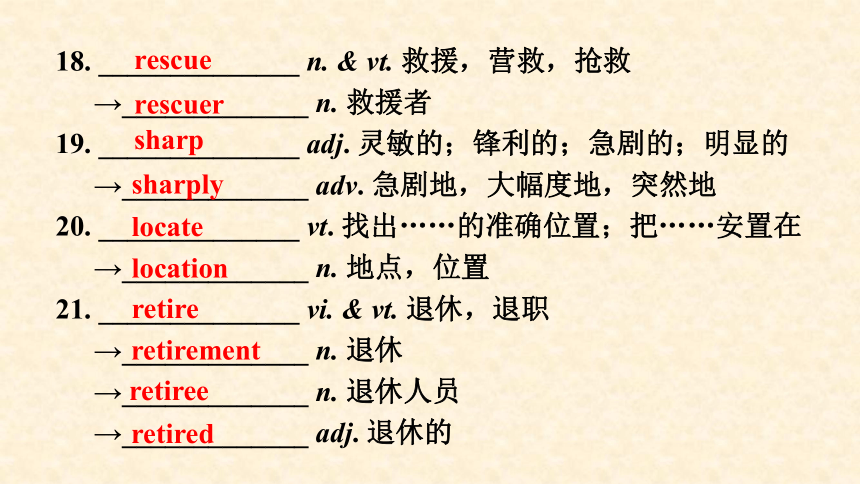
文档简介
(共72张PPT)
牛津新教材必修3
Unit 2 Natural disasters
_____________ n. 郡,县
_____________ n. 灾难,灾害;彻底失败
_____________ n. 碰撞声,破裂声;碰撞;崩溃
vi. & vt. 碰撞,撞击;崩溃
_____________ vi. & vt. 发信号,示意;标志
n. 信号,暗号;标志;信号灯
_____________ vt. & vi. 出去,离去,退场;退出
n. 出口,通道,离开
6. _____________ n. 楼梯,梯级
county
disaster
crash
signal
exit
stair
7. ______________ n. 名单;卷;一管;翻滚
vi. & vt. 翻滚,滚动;翻身;卷起
8. ______________ vt. 拥抱,搂抱;抱紧
9. ______________ n. 程序,步骤,手续
10. _____________ n. 海啸
11. _____________ adj. 奇怪的,怪异的;偶尔的;不成对的
12. _____________ n. 泡沫,泡,气泡
13. _____________ n. 台风
14. _____________ n. 柱,杆;极
15. _____________ n. 飓风
roll
hug
procedure
tsunami
odd
bubble
typhoon
pole
hurricane
16. ______________ n. 会议,研讨会;讨论,商谈
17. ______________ n. 补给,补给品;供应;供应量,储备
vt. 供应,供给,提供
18. ______________ n. 慈善机构(或组织); 慈善, 施舍, 仁爱, 宽容
19. ______________ n. 全体员工; 管理人员
vt. 在……工作,任职于
20. ______________ n. 幻灯片;降低;滑行;山崩
vi. & vt. 滑行;逐渐陷入
21. ______________ n. 资金;基金
conference
supply
charity
staff
slide
fund
22. ______________ n. 洪水,水灾;大量
vi. & vt. 淹没,泛滥;大量涌入;充满
23. ______________ adv. 在楼下,往楼下 n. 楼下
24. ______________ n. 文件,公文;(计算机中的)文档
25. ______________ n. (爱称)亲爱的;蜂蜜
26. ______________ adv. 否则,不然;除此以外
27. ______________ vt. 使出土,挖掘,发掘;发现,找到
28. ______________ n. 目的地,终点
29. ______________ n. 酒吧; 小馆子; 吧台; 条,块; 栏杆,障碍
vt. 封;阻挡;阻止
flood
downstairs
document
honey
otherwise
unearth
destination
bar
30. ______________ n. 港口,避风港;港口城市
31. ______________ adj. 高耸入云的,送入云霄的
32. ______________ adj. 覆盖着灰的;灰色的
33. ______________ n. 黎明, 破晓; 开端, 萌芽 vi. 开始,开始清楚
34. ______________ n. 火山
35. ______________ n. 树干
36. ______________ adv. 在(或向)较远处,在另一边
prep. 在(或向)更远处;超出;晚于;无法
37. ______________ n. 图案,花样;模式;范例;模型
38. ______________ n. 柱,圆柱;柱状物;栏;专栏;队,列
port
cloud-capped
ashy
dawn
volcano
trunk
beyond
pattern
column
1. _______________ vt. 伤害,使受伤;损害
→_____________ n. 伤害,损害
→_____________ adj. 受伤的,受损害的
2. react vi. 回应,(对……)做出反应
→_____________ n. 反应,回应;抗拒;化学反应
3. order n. 次序;条理;治安;命令;订货;点菜;秩序
→_____________ v. 命令;订货;点菜;组织
→_____________ adj. 有秩序的,有条理的,整齐的
injure
injury
injured
reaction
order
orderly
4. _______________ vt. 证实,确认;使确信;批准
→_____________ n. 证实;确认书;证明书
5. _______________ vi. 发生,出现;存在于
→_____________ n. 发生,出现;发生的事,事件
6. _______________ n. 宽慰,轻松;减轻,消除;救济
→_____________ vt. 减轻,缓和;解除(职务)
→_____________ adj. 感到欣慰的
7. destruct vt. 毁坏,毁灭,破坏
→_____________ adj. 引起破坏(或毁灭)的,破坏(或毁灭)性的
confirm
confirmation
occur
occurrence
relief
relieve
relieved
destructive
8. _______________ vt. 了解,熟悉;通知
→_____________ adj. 有学问的;见多识广的
→_____________ n. 信息,消息
9. _______________ n. 震惊,惊愕;剧烈震动 vt. 使震惊
→_____________ adj. 非常糟糕的,令人气愤的(多修饰事物)
→_____________ adj. 震惊的, 愤慨的 (多指人的感受, 表情等)
10. ______________ vt. & vi. 惊吓,害怕 n. 恐慌;惊吓
→_____________ adj. 恐慌的,惊吓的;害怕的
→_____________ adj. 让人害怕的;让人恐慌的
inform
informed
information
shock
shocking
shocked
scare
scared
scary
11. _______________ n. 电, 电力; 权力; 政权; 能力; 能量; 力量
→_____________ adj. 有影响力的;强有力的
12. _______________ vt. 捐赠,赠送;献(血)
→_____________ n. 捐赠,捐款
→_____________ n. 捐赠者
13. _______________ adj. 好奇的;奇特的
→_____________ n. 好奇心;好奇
14. _______________ vi. & vt. (火山)爆发;突然发生
→_____________ n. 爆发;喷发
power
powerful
donate
donation
donator
curious
curiosity
erupt
eruption
15. ______________ n. 进口产品,输入的产品;输入
vt. 进口,引进
→____________ n. 出口产品,输出的产品;出口,输出
vt. 出口,输出
16. bear vt. 忍受,忍耐,经受住
→_____________ adj. 难耐的,无法忍受的
17. ______________ n. 遥远,久远;举例;差异;疏远
→_____________ adj. 远远地,疏远的
→_____________ adv. 遥远地;疏远地
import
export
unbearable
distance
distant
distantly
18. ______________ n. & vt. 救援,营救,抢救
→_____________ n. 救援者
19. ______________ adj. 灵敏的;锋利的;急剧的;明显的
→_____________ adv. 急剧地,大幅度地,突然地
20. ______________ vt. 找出……的准确位置;把……安置在
→_____________ n. 地点,位置
21. ______________ vi. & vt. 退休,退职
→_____________ n. 退休
→_____________ n. 退休人员
→_____________ adj. 退休的
rescue
rescuer
sharp
sharply
locate
location
retire
retirement
retiree
retired
__________________ 整个,全部
__________________ 以防万一
__________________ 点名
__________________ 安然无恙的
__________________ 安全事务处理程序
__________________ 突然想到,浮现在脑中
__________________ (在困境中)保持冷静
__________________ 警告某人某事
at large
in case
roll call
safe and sound
safety procedure
occur to
keep one’s head
warn sb of sth
9. ___________________ 使某人宽慰的是
10. __________________ 在生死之间
11. __________________ 吹走,吹跑
12. __________________ 用完,耗尽
13. __________________ 呈现……的形状;采取……
14. __________________ 突然开始,爆发
15. __________________ 在远方
16. __________________ 到处,各处
17. __________________ 休息地,休息场所;安息地,长眠地
18. __________________ 似乎,好像
to one’s great relief
between life and death
blow away
run out of
take the form of
break out
in the distance
far and wide
resting place
as if
Alice Brown, head teacher at Falmont Primary School, was teaching when the floor began to shake. (P 16)
was/were doing…when…结构
2. At the same time, Miss Brown quickly opened the classroom door, in case it became damaged during the shaking and could not open. (P 16)
in case 引导目的状语从句
3. The moment the shaking stopped, Miss Brown sensed it was the best time for the class to make their escape. (P 16)
the moment 引导时间状语从句
4. You know, going outside during a hurricane is much too dangerous. (P 20)
v.-ing 短语作主语
5. The hurricane must have caused a lot of damage and suffering. (P 20)
must have done 表示对过去情况的推测
6. Each turned to fly — each running, pressing, pushing against the other. (P 26)
代词+分词 构成独立主格结构
7. Its walls were fresh as if painted yesterday; not a single colour changed on the rich pattern of its floors. (P 26)
as if引导的状语从句,从句中有省略
1. injure vt. 伤害,使受伤;损害
Only 5 students suffered slight injuries, despite the current figures of 7 killed and over 200 injured in the disaster area at large. (P 16)
injured adj. 受伤的;有伤的
get injured 受伤 the injured 伤员
injury n. 伤害;损伤
do sb. an injury / do an injury to sb 伤害某人
hurt, wound & injure
词条 释义及用法 例句
hurt 可表示精神上或肉体上受伤,意思是“(使)疼痛” My back is really hurting today.
wound 主要是指战场上受伤,有伤口 The hero was wounded badly in the battle.
injure 一般指因意外或事故而造成损伤 injure sb’s feeling 伤害某人的情感 The bomb killed 11 people and injured 55.
【语境应用】翻译句子。
1) 我希望我说那件事没有伤害到她的感情。
2) 小心!不要用那个工具伤着你。
3) 头部的重伤使得那个消防员在医院躺了好几天。
I hope I didn’t injure/hurt her feelings by saying that.
Watch out! Don’t injure yourself with that tool.
The severe head injury left the firefighter lying in hospital for days.
2. crash n. 碰撞声,破裂声;碰撞,崩溃
vi. & vt. 碰撞,撞击;崩溃
There were loud crashes of glass breaking and things falling to the ground, but the students remained still and waited calmly and quietly. (P 16)
a car/plane crash 汽车撞车事故/飞机失事
in a crash 在撞击事故中
with a crash 突然地巨响,哗啦一声倒下
crash sth into/through sth 把……撞到……上
crash into pieces 撞得粉碎
【语境应用】完成句子。
1) The plane _____________________________ (撞上了山头).
2) The tree fell _____________________________ (哗啦一声倒了).
3) Luckily, no people were killed ______________________ (汽车撞车事故中).
4) A brick _________________________ (哗啦一声击穿了窗户).
crashed into a mountain
with a (great) crash
in the car crash
crashed through the window
3. exit vt. & vi. 出去,离去,退场 n. 出口,通道;离开
She signalled to her students to exit the classroom in an orderly line covering their heads with their hands. (P 16)
exit the party/theatre 从聚会/剧院离开
exit from/through 从……离去
an emergency exit 紧急出口
a fire exit 安全出口/消防通道
entre v. 进入
entrance n. 入口
【语境应用】根据括号内的汉语提示补全下面句子(每空一词,含缩略形式)。
1) Seeing the police coming, the thief ________ ________ ________ (出去) through the window.
2) ________ ________ ________ ________ (请退出剧场) through the side doors.
3) ________ ________ ________ ________ (有个消防通道) on each floor of the building.
made his / an
exit
Please exit the theatre
There’s a fire exit
4. confirm vt. 证实,确认;使确信;批准
After a roll call confirmed that all were safe and sound, they relaxed, laughing, crying and hugging each other. (P 16)
confirm sb in sth 使某人确信某事
confirm that/wh-从句 证实……
It has been confirmed that… 已经证实……
confirmation n. 证实,确认
confirmed adj. 坚定的,根深蒂固的
【语境应用】翻译下面句子。
1) 这项研究证实了早期的研究结果。
2) 会议日期还没有最后确定。
3) 他的话肯定了我的信念,即我们所做的是正确的。
The study confirms the findings of earlier research.
The date of the meeting is still to be confirmed.
His words confirmed my belief that what we had done was right./ His words confirmed me in my belief that what we had done was right.
5. occur vi. 发生,出现;存在于
It immediately occurred to her that these were signs of an approaching tsunami. (P 17)
It occurs to sb that 某人想起……
It occurs to sb to do sth 某人想起做某事
Sth occurs to sb 想法/念头等出现在某人脑海里
occurrence n. 发生的事,事件;出现,发生
a common/everyday/regular/rare occurrence
司空见惯的/每天发生的/定期发生的/很少发生的事情
【语境应用】根据括号内的汉语提示补全下面句子(每空一词)。
1) She was in great difficulty, but ________ ________ ________ ________ ________ (她从未想过) to ask anyone for help.
2) Violence of some sort seems ________ ________ (存在) in every society.
3) ________ ________ ________ ________ ________ (他想到这个主意) in a dream.
4) Flooding in this area is _________ _________ _________ (经常发生的事情).
it never occurred
to her
to occur
The idea occurred to him
a common/frequent occurrence
6. inform vt. 了解,熟悉;通知
Remember to inform yourself of what is going on. (P 19)
inform sb of/about sth 通知某人某事
inform sb that… 通知某人
inform against/on 告发,检举
information n. 消息,信息 a piece of information
informed adj. 消息灵通的; 见多识广的
keep sb informed 不断给某人提供最新消息
【语境应用】根据括号内的汉语提示补全下面句子。
1) Please ______________________________________________ (告知我们有关你境况的任何变动).
2) Parents _____________________________________ (被告知这所学校即将关闭).
3) He said he had _____________________________________ (告发了他的亲弟弟).
inform us of/about any changes in your circumstances
were informed that the school was closing
informed against / on his own brother
7. shock n. 震惊,惊愕;剧烈震动 vt. 使震惊
As you can imagine, it was a bit of a shock. (P 20)
suffer from shock 陷入休克状态
be in a state of shock 惊魂未定/处于休克状态
in shock 处在震惊中
to one’s shock 令某人震惊的是
a big/great shock 极大的震惊
get/have a shock 感到震惊
give sb a shock 震惊某人
shocked adj. 惊愕的,震惊的
be shocked at/by 对……感到震惊
be shocked to do sth 对某事感到震惊
a shocked look/expression 震惊的表情
shocking adj. 令人震惊的,令人憎恶的
a piece of shocking news 令人震惊的消息
shocking behavior 骇人听闻的行为
【语境应用】 用shock的适当形式填空。
1) The news of his mother’s death was a terrible ___________ to him.
2) What ____________ us most was that such a good boy should quarrel with his father.
3) O. Henry’s short stories always gave the readers __________ endings.
4) He ____________ to see her smoke.
was shocked
shock
shocked
shocking
8. scare vt. & vi. 惊吓,害怕 n. 恐慌;惊吓
The strong wind and heavy rain didn’t scare me, but I was quite frightened during the power failure. (P 20)
scare…off/away 把……吓跑
scare sb into doing sth 恐吓某人做某事
cause a major scare 引起严重恐慌
scared adj. 害怕的,对……感到惊慌的
scary adj. 恐怖的,吓人的
【语境应用】根据语境完成下列句子。(每空一词)
1) When the stranger entered the house, the dogs _________ him _________ running away.
2) To tell the truth, I did get _________ _________, when you stood beside me without making a sound.
3) The airport has been dealing with the problem of _________ birds _________ from airport runways.
scared
into
a scare
scaring
away
9. supply n. 补给,补给品;供应;供应量,储备
vt. 供应,供给,提供
Were you afraid of running out of supplies (P 20)
supply sb with sth = supply sth to sb 提供给某人某物
food/water/electricity supply 食物/水/电力供给
supply and demand 供求关系
表示“提供给某人某物”还可以用:
provide sb with sth/ provide sth for sb.
offer sb sth/ offer sth to sb
【语境应用】用provide/offer/supply完成句子。
1) Anna’s school ________ her a very good chance last year.
2) Can you ________ fifteen rooms for thirty people
3) That company ________ paper to the printers.
4) The water __________ is unsafe.
offered
provide
supplies
supply
10. retire vi. & vt. 退休,退职
In that case, they have to retire. (P 27)
retire from 从……职位上退休
retire from service 退役
retire from office 退职
retired adj. 已退休的;已退役的
retiring adj. 即将退休的;孤僻的;害羞的
retirement n. 退休;退职
go into retirement 退休;退役
retirement insurance 养老保险
【语境应用】 用retire的适当形式完成下列句子。
1) He will ___________ from playing at the end of the season.
2) He was asked to continue teaching after ___________ age.
3) A few ___________ people were doing exercises in front of the “Professor Building”.
4) On his ___________ from service, he went to live in the mountains.
5) ___________ footballers sometimes choose to become football coaches.
retire
retirement
retired
retirement
Retired
1. run out of 用完,耗完
Were you afraid of running out of supplies (P 20)
run out of 与run out
run out of =use up 及物动词短语,不用于被动语态,主语多是人 We are running out of water.
run out= be used up 不及物动词短语,主语常是时间、食物、金钱、耐心等 His patience has run out.
【语境应用】完成句子。
1) All our supply of food has ___________________________
_______________.
2) We are _____________________ our gas. We can’t go any farther.
3) His money has completely _________________.
run out /been run out of/
running out of /using up
run out
been used up
2. take the form of 呈现……的形状;采取……的形状
It took the form of a huge tree: the trunk, blackness, the branches, fire! (P 25)
in the form of 以……的形式
take form 逐渐成形
in / out of form 处于良好的 / 不良的竞技状态
fill in / out a form 填表
【语境应用】 汉译英。
1) 她最近状态很好。
She has been in form recently.
2) 填好表格并寄回。
Fill in the form and send it back.
3) 为了准备比赛,我们下一堂课将采用辩论的形式。
Our next class will take the form of a debate to prepare for the competition.
3. break out 突然开始,爆发
The cries of women broke out; the men looked at each other, but were silent. (P 26)
break away from 突然挣脱; 逃脱
break down 出故障; 垮掉
break into 强行进入/闯入
break off 断开; 中断
break through 取得突破
break up 结束;解散;(使)破裂/分裂
【语境应用】 用含break的短语的正确形式填空。
1) Someone ____________ my car and stole the radio.
2) They escaped to America shortly before war ___________ in 1939.
3) He __________ the chocolate and gave every child in the room a piece.
4) She started to speak, then ____________ while a waitress served us coffee.
5) The printing machines are always _____________. We need to buy some new ones.
broke into
broke out
broke up
broke off
breaking down
1. was/were doing…when… 正在做……,这时/突然……
Alice Brown, head teacher at Falmont Primary School, was teaching when the floor began to shake. (P 16)
类似的表达还有:
be on the point of doing sth when…/
be about to do sth when… 正要做某事,这时/突然……
had (just) done sth when… 刚做完某事,这时/突然……
【语境应用】翻译句子。
他正在专心学习,这时听到有人敲门。
He was concentrating on his study when he heard a knock at the door.
2) 她刚到家,就下雨了。
She had just arrived home when it rained.
3) 我们正要离开,Jerry来了。
We were just about to leave when Jerry arrived. / We were on the point of leaving when Jerry arrived.
2. the moment 一……就……,引导时间状语从句
The moment the shaking stopped, Miss Brown sensed it was the best time for the class to make their escape. (P 16)
有些表示时间的短语,如the day, the year, each/every time, (the) next time, the first/second time, by the time, the instant等也可引导时间状语从句
副词如immediately, instantly, directly等也引导时间状语从句
【语境应用】补全句子。
_________________________________ (每当我听音乐) I’ll think of it.
______________________________________ (我一看到他) I knew that there was no hope.
He flinched ______________________________ (每次她和他讲话).
Every/Each time I listen to music
The moment/instant/minute/second I saw him
every/each time she spoke to him
3. as if 引导的状语从句,从句有省略
Its walls were fresh as if painted yesterday; not a single colour changed on the rich pattern of its floors. (P 26)
从句谓语部分含有be动词,且从句主语和主句主语一致或从句主语是it时,状语从句可省略;
从句常省略的成分是:主语和be动词;省略后的形式是“连词 + 非谓语动词/形容词”;
从句可由when, while, once, before, whenever, if, as if/ though, unless, though, although等引导。
【语境应用】完成句子。
Often she would weep ________________________ (当她一个人时).
He gave good practical advice _____________________ (当有人问他时).
Try to practice your English ______________________ (只要可能).
He opened his mouth _____________________ (似乎要说) something important.
when (she was) alone
when (he was) asked
whenever possible
as if to say
动词不定式作定语和结果状语
动词不定式作定语
一般置于被修饰的名词或代词后面,与名词或代词之间常有一定的逻辑关系。如:
名词或代词为动词不定式的逻辑主语
e.g. Wendy was the first one to arrive at school.
2) 名词或代词为动词不定式的逻辑宾语
e.g. I have a meeting to attend.
This is a good topic to talk about. (注意介词不可缺)
3) 名词与动词不定式是同位关系
e.g. She expressed a wish to make a change.
4) 动词不定式作定语,有被动形式
e.g. The house to be built there will be a library.
当名词或代词前有形容词最高级、序数词或 only修饰时,常用不定式作后置定语。
e.g. The youngest person to enter the program was just fourteen.
The window seat is usually the first one to be taken.
Linda was the only one to stay for the whole performance.
动词不定式作状语
动词不定式作结果状语常见于如下结构中:
too…to 结构中
e.g. It’s never too late to learn.
2) enough to…结构中
e.g. I was fortunate enough to get the ticket.
3) so…as to…结构中
e.g. Jane sang so well as to come out first in the singing competition.
4) never to 结构中
e.g. He left home, never to return.
5) only to 结构中 (常指没有预料到的结果)
e.g. I hurried to the station, only to find the train gone.
动词不定式作状语时,除了表示结果,还可以表示目的、原因等。
1. 主语 + be + adj. + to do sth.结构中不定式常作原因状语,此类形容词有happy, sorry, glad, excited, disappointed, shocked, satisfied, astonished等。如:
They were glad to see their son taken good care of in the kindergarten.
2. 不定式作目的状语既可放在句首也可放在句尾,不定式前可加in order或so as。如:
He had to earn enough money to support the family.
In order to master English, you must spend much effort on it.
I. 用括号内动词的正确形式填空。
1. After months of unemployment, all he asked for was a chance _____________ (earn) his bread.
2. The opportunity ____________ (live) in Beijing interested Sandra.
3. They were glad _____________ (see) their son taken good care of in the kindergarten.
4. His first book ______________ (publish) next month is based on a true story.
to earn
to live
to see
to be published
5. I walked all the way from home to the library, only ________ (find) it closed.
6. He had to earn enough money __________ (support) the family.
7. I have a lot of readings ___________ (complete) before the end of this term.
8. —Can the project be finished as planned
—Sure, _________ (get) it completed in time, we'll work two more hours a day.
to find
to support
to complete
to get
II. 根据语篇内容,用括号里的词的正确形式填空。
Sending people to other planets or even beyond the solar system is not an easy goal _________ (achieve). One of the problems is that the trip would take a very long time. For example, _________ (use) the current technology, it would take over two years _________ (get) to the closest planet, Mars, and back. Although light is the fastest thing _________(know) in the universe, it could take more than four years to reach the nearest star system.
to achieve
using
to get
known
Will scientists figure out a way _________(store) sufficient food and water for the long journey Is it possible to travel faster than light No one knows the answers yet. However, space scientists never give up. They are experimenting with growing crops in space so as _________(help) astronauts get enough food on longer journeys through space.
to store
to help
1. Mary's sister, Frances Todd Wallace, often came over _________ (plant) flowers in the front yard.
(2021年6月浙江卷)
to plant
2. Chinese researchers hope to use the instruments onboard Chang’e-4 ________ (find) and study areas of the South Pole-Aitken basin. (2020新课标全国I)
to find
3. Agriculture gave people their first experience of the power of technology _________ (change) lives. (2020浙江)
to change
如何用英语续写故事
【写作任务】
阅读下面材料,根据其内容和所给段落开头语续写两段,使之构成一篇完整的短文。
I woke up at 5:20 a.m. to a gurgling (潺潺的) sound outside our door. I said to my husband Andrew, “What’s that sound All the cars are slowing down and it sounds like we have had a lot of rain!” He raised his shoulders and then lowered them again, and told me to go back to sleep.
After another half an hour, I decided to get out of bed and see what was happening outside. I got to the door and turned on the light. At this point there was no water in our room, but when I opened the door I saw that it was rising extremely fast and that there wasn’t much time before it would be inside! I rang my mum immediately but she didn’t sound too concerned. Andrew and I moved our valuables to a storage floor above our room, and I managed to make sure the most important thing, my dog, was safe.
By 6:30 a.m., the water was still rising and was probably half a metre deep. All our cars were now under water and unable to move. Though our dog was safe, we hadn’t seen or heard from our cat Coco.
When the sun rose we could see the damage that had been done. Fences ( 栅栏) had been knocked down, and pieces of wood that had been lying around our property (所有物) were now down in the neighbours’ yards.
注意:1. 续写词数应为150左右;
2. 请按如下格式在相应位置作答。
Suddenly, I heard a cry coming from my yard. ____________ __________________________________________________________________________________________________________________________________________________________________
Finally, at about 3:30 p.m. the water started to go down. ____ ____________________________________________________________________________________________________________
______________________________________________________
一、审题定调
读后续写要求根据所提供的材料,充分发挥想象力,大胆预测文章缺失部分的内容,进行充满个性色彩的设计,对原文作延伸。
写作时应注意以下几点:
1. 在读懂原文的基础上,以原文内容为起点,写出故事情节的发展和变化;
2. 续写的内容要有明确的中心或主题,做到合情合理、真实生动;
3. 续写的内容要在主要人物的思想行为、性格特点、语言特点和风格上与原文保持一致。
二、谋篇布局
第一段:由该段开头语“突然间,我听到一声喊叫从院子里传来”可知,本段我们主要围绕Coco被困展开。
第二段:由该段开头语“最终在下午三点半左右,水位开始下降”可知,Coco此前并未得到救援,因此,本段主要围绕救援Coco展开。
三、范文欣赏
范文一
Suddenly, I heard a cry coming from my yard. I knew that sound. It was Coco! I looked out of the window, only to see that she was trapped in the tree. My heart and stomach sank. I asked Andrew if we could open the door and get her in, but he said it wasn’t a good idea as the floodwater would flow into the house. I had no other choice but to keep watching her to make sure she was still in the tree.
Finally, at about 3:30 p.m. the water started to go down. I rushed out to the yard. “Coco, Coco,” I kept calling her name when standing under the tree. Then, Coco jumped down. I felt much relieved. We took her inside immediately, dried her with some old towels, and put her in front of the fire to get her recovered.
范文二
Suddenly, I heard a cry coming from my yard. “It must be Coco!” I said to Andrew. When I looked out of the window, I saw my poor Coco being trapped in the tree. However, Andrew and I could not go outside immediately to save her because there was no sign that the water was going down. I was so worried that I kept watching Coco to make sure she was still there.
Finally, at about 3:30 p.m. the water started to go down. I rushed out of the house with some towels to help Coco. Standing under the tree, I kept calling “Coco, Coco, Mom is here.” Hearing my voice, Coco jumped down from the tree. Being frightened, she rushed into the house quickly. We then bathed, dried and fed her until she recovered herself. So poor my little Coco was!
牛津新教材必修3
Unit 2 Natural disasters
_____________ n. 郡,县
_____________ n. 灾难,灾害;彻底失败
_____________ n. 碰撞声,破裂声;碰撞;崩溃
vi. & vt. 碰撞,撞击;崩溃
_____________ vi. & vt. 发信号,示意;标志
n. 信号,暗号;标志;信号灯
_____________ vt. & vi. 出去,离去,退场;退出
n. 出口,通道,离开
6. _____________ n. 楼梯,梯级
county
disaster
crash
signal
exit
stair
7. ______________ n. 名单;卷;一管;翻滚
vi. & vt. 翻滚,滚动;翻身;卷起
8. ______________ vt. 拥抱,搂抱;抱紧
9. ______________ n. 程序,步骤,手续
10. _____________ n. 海啸
11. _____________ adj. 奇怪的,怪异的;偶尔的;不成对的
12. _____________ n. 泡沫,泡,气泡
13. _____________ n. 台风
14. _____________ n. 柱,杆;极
15. _____________ n. 飓风
roll
hug
procedure
tsunami
odd
bubble
typhoon
pole
hurricane
16. ______________ n. 会议,研讨会;讨论,商谈
17. ______________ n. 补给,补给品;供应;供应量,储备
vt. 供应,供给,提供
18. ______________ n. 慈善机构(或组织); 慈善, 施舍, 仁爱, 宽容
19. ______________ n. 全体员工; 管理人员
vt. 在……工作,任职于
20. ______________ n. 幻灯片;降低;滑行;山崩
vi. & vt. 滑行;逐渐陷入
21. ______________ n. 资金;基金
conference
supply
charity
staff
slide
fund
22. ______________ n. 洪水,水灾;大量
vi. & vt. 淹没,泛滥;大量涌入;充满
23. ______________ adv. 在楼下,往楼下 n. 楼下
24. ______________ n. 文件,公文;(计算机中的)文档
25. ______________ n. (爱称)亲爱的;蜂蜜
26. ______________ adv. 否则,不然;除此以外
27. ______________ vt. 使出土,挖掘,发掘;发现,找到
28. ______________ n. 目的地,终点
29. ______________ n. 酒吧; 小馆子; 吧台; 条,块; 栏杆,障碍
vt. 封;阻挡;阻止
flood
downstairs
document
honey
otherwise
unearth
destination
bar
30. ______________ n. 港口,避风港;港口城市
31. ______________ adj. 高耸入云的,送入云霄的
32. ______________ adj. 覆盖着灰的;灰色的
33. ______________ n. 黎明, 破晓; 开端, 萌芽 vi. 开始,开始清楚
34. ______________ n. 火山
35. ______________ n. 树干
36. ______________ adv. 在(或向)较远处,在另一边
prep. 在(或向)更远处;超出;晚于;无法
37. ______________ n. 图案,花样;模式;范例;模型
38. ______________ n. 柱,圆柱;柱状物;栏;专栏;队,列
port
cloud-capped
ashy
dawn
volcano
trunk
beyond
pattern
column
1. _______________ vt. 伤害,使受伤;损害
→_____________ n. 伤害,损害
→_____________ adj. 受伤的,受损害的
2. react vi. 回应,(对……)做出反应
→_____________ n. 反应,回应;抗拒;化学反应
3. order n. 次序;条理;治安;命令;订货;点菜;秩序
→_____________ v. 命令;订货;点菜;组织
→_____________ adj. 有秩序的,有条理的,整齐的
injure
injury
injured
reaction
order
orderly
4. _______________ vt. 证实,确认;使确信;批准
→_____________ n. 证实;确认书;证明书
5. _______________ vi. 发生,出现;存在于
→_____________ n. 发生,出现;发生的事,事件
6. _______________ n. 宽慰,轻松;减轻,消除;救济
→_____________ vt. 减轻,缓和;解除(职务)
→_____________ adj. 感到欣慰的
7. destruct vt. 毁坏,毁灭,破坏
→_____________ adj. 引起破坏(或毁灭)的,破坏(或毁灭)性的
confirm
confirmation
occur
occurrence
relief
relieve
relieved
destructive
8. _______________ vt. 了解,熟悉;通知
→_____________ adj. 有学问的;见多识广的
→_____________ n. 信息,消息
9. _______________ n. 震惊,惊愕;剧烈震动 vt. 使震惊
→_____________ adj. 非常糟糕的,令人气愤的(多修饰事物)
→_____________ adj. 震惊的, 愤慨的 (多指人的感受, 表情等)
10. ______________ vt. & vi. 惊吓,害怕 n. 恐慌;惊吓
→_____________ adj. 恐慌的,惊吓的;害怕的
→_____________ adj. 让人害怕的;让人恐慌的
inform
informed
information
shock
shocking
shocked
scare
scared
scary
11. _______________ n. 电, 电力; 权力; 政权; 能力; 能量; 力量
→_____________ adj. 有影响力的;强有力的
12. _______________ vt. 捐赠,赠送;献(血)
→_____________ n. 捐赠,捐款
→_____________ n. 捐赠者
13. _______________ adj. 好奇的;奇特的
→_____________ n. 好奇心;好奇
14. _______________ vi. & vt. (火山)爆发;突然发生
→_____________ n. 爆发;喷发
power
powerful
donate
donation
donator
curious
curiosity
erupt
eruption
15. ______________ n. 进口产品,输入的产品;输入
vt. 进口,引进
→____________ n. 出口产品,输出的产品;出口,输出
vt. 出口,输出
16. bear vt. 忍受,忍耐,经受住
→_____________ adj. 难耐的,无法忍受的
17. ______________ n. 遥远,久远;举例;差异;疏远
→_____________ adj. 远远地,疏远的
→_____________ adv. 遥远地;疏远地
import
export
unbearable
distance
distant
distantly
18. ______________ n. & vt. 救援,营救,抢救
→_____________ n. 救援者
19. ______________ adj. 灵敏的;锋利的;急剧的;明显的
→_____________ adv. 急剧地,大幅度地,突然地
20. ______________ vt. 找出……的准确位置;把……安置在
→_____________ n. 地点,位置
21. ______________ vi. & vt. 退休,退职
→_____________ n. 退休
→_____________ n. 退休人员
→_____________ adj. 退休的
rescue
rescuer
sharp
sharply
locate
location
retire
retirement
retiree
retired
__________________ 整个,全部
__________________ 以防万一
__________________ 点名
__________________ 安然无恙的
__________________ 安全事务处理程序
__________________ 突然想到,浮现在脑中
__________________ (在困境中)保持冷静
__________________ 警告某人某事
at large
in case
roll call
safe and sound
safety procedure
occur to
keep one’s head
warn sb of sth
9. ___________________ 使某人宽慰的是
10. __________________ 在生死之间
11. __________________ 吹走,吹跑
12. __________________ 用完,耗尽
13. __________________ 呈现……的形状;采取……
14. __________________ 突然开始,爆发
15. __________________ 在远方
16. __________________ 到处,各处
17. __________________ 休息地,休息场所;安息地,长眠地
18. __________________ 似乎,好像
to one’s great relief
between life and death
blow away
run out of
take the form of
break out
in the distance
far and wide
resting place
as if
Alice Brown, head teacher at Falmont Primary School, was teaching when the floor began to shake. (P 16)
was/were doing…when…结构
2. At the same time, Miss Brown quickly opened the classroom door, in case it became damaged during the shaking and could not open. (P 16)
in case 引导目的状语从句
3. The moment the shaking stopped, Miss Brown sensed it was the best time for the class to make their escape. (P 16)
the moment 引导时间状语从句
4. You know, going outside during a hurricane is much too dangerous. (P 20)
v.-ing 短语作主语
5. The hurricane must have caused a lot of damage and suffering. (P 20)
must have done 表示对过去情况的推测
6. Each turned to fly — each running, pressing, pushing against the other. (P 26)
代词+分词 构成独立主格结构
7. Its walls were fresh as if painted yesterday; not a single colour changed on the rich pattern of its floors. (P 26)
as if引导的状语从句,从句中有省略
1. injure vt. 伤害,使受伤;损害
Only 5 students suffered slight injuries, despite the current figures of 7 killed and over 200 injured in the disaster area at large. (P 16)
injured adj. 受伤的;有伤的
get injured 受伤 the injured 伤员
injury n. 伤害;损伤
do sb. an injury / do an injury to sb 伤害某人
hurt, wound & injure
词条 释义及用法 例句
hurt 可表示精神上或肉体上受伤,意思是“(使)疼痛” My back is really hurting today.
wound 主要是指战场上受伤,有伤口 The hero was wounded badly in the battle.
injure 一般指因意外或事故而造成损伤 injure sb’s feeling 伤害某人的情感 The bomb killed 11 people and injured 55.
【语境应用】翻译句子。
1) 我希望我说那件事没有伤害到她的感情。
2) 小心!不要用那个工具伤着你。
3) 头部的重伤使得那个消防员在医院躺了好几天。
I hope I didn’t injure/hurt her feelings by saying that.
Watch out! Don’t injure yourself with that tool.
The severe head injury left the firefighter lying in hospital for days.
2. crash n. 碰撞声,破裂声;碰撞,崩溃
vi. & vt. 碰撞,撞击;崩溃
There were loud crashes of glass breaking and things falling to the ground, but the students remained still and waited calmly and quietly. (P 16)
a car/plane crash 汽车撞车事故/飞机失事
in a crash 在撞击事故中
with a crash 突然地巨响,哗啦一声倒下
crash sth into/through sth 把……撞到……上
crash into pieces 撞得粉碎
【语境应用】完成句子。
1) The plane _____________________________ (撞上了山头).
2) The tree fell _____________________________ (哗啦一声倒了).
3) Luckily, no people were killed ______________________ (汽车撞车事故中).
4) A brick _________________________ (哗啦一声击穿了窗户).
crashed into a mountain
with a (great) crash
in the car crash
crashed through the window
3. exit vt. & vi. 出去,离去,退场 n. 出口,通道;离开
She signalled to her students to exit the classroom in an orderly line covering their heads with their hands. (P 16)
exit the party/theatre 从聚会/剧院离开
exit from/through 从……离去
an emergency exit 紧急出口
a fire exit 安全出口/消防通道
entre v. 进入
entrance n. 入口
【语境应用】根据括号内的汉语提示补全下面句子(每空一词,含缩略形式)。
1) Seeing the police coming, the thief ________ ________ ________ (出去) through the window.
2) ________ ________ ________ ________ (请退出剧场) through the side doors.
3) ________ ________ ________ ________ (有个消防通道) on each floor of the building.
made his / an
exit
Please exit the theatre
There’s a fire exit
4. confirm vt. 证实,确认;使确信;批准
After a roll call confirmed that all were safe and sound, they relaxed, laughing, crying and hugging each other. (P 16)
confirm sb in sth 使某人确信某事
confirm that/wh-从句 证实……
It has been confirmed that… 已经证实……
confirmation n. 证实,确认
confirmed adj. 坚定的,根深蒂固的
【语境应用】翻译下面句子。
1) 这项研究证实了早期的研究结果。
2) 会议日期还没有最后确定。
3) 他的话肯定了我的信念,即我们所做的是正确的。
The study confirms the findings of earlier research.
The date of the meeting is still to be confirmed.
His words confirmed my belief that what we had done was right./ His words confirmed me in my belief that what we had done was right.
5. occur vi. 发生,出现;存在于
It immediately occurred to her that these were signs of an approaching tsunami. (P 17)
It occurs to sb that 某人想起……
It occurs to sb to do sth 某人想起做某事
Sth occurs to sb 想法/念头等出现在某人脑海里
occurrence n. 发生的事,事件;出现,发生
a common/everyday/regular/rare occurrence
司空见惯的/每天发生的/定期发生的/很少发生的事情
【语境应用】根据括号内的汉语提示补全下面句子(每空一词)。
1) She was in great difficulty, but ________ ________ ________ ________ ________ (她从未想过) to ask anyone for help.
2) Violence of some sort seems ________ ________ (存在) in every society.
3) ________ ________ ________ ________ ________ (他想到这个主意) in a dream.
4) Flooding in this area is _________ _________ _________ (经常发生的事情).
it never occurred
to her
to occur
The idea occurred to him
a common/frequent occurrence
6. inform vt. 了解,熟悉;通知
Remember to inform yourself of what is going on. (P 19)
inform sb of/about sth 通知某人某事
inform sb that… 通知某人
inform against/on 告发,检举
information n. 消息,信息 a piece of information
informed adj. 消息灵通的; 见多识广的
keep sb informed 不断给某人提供最新消息
【语境应用】根据括号内的汉语提示补全下面句子。
1) Please ______________________________________________ (告知我们有关你境况的任何变动).
2) Parents _____________________________________ (被告知这所学校即将关闭).
3) He said he had _____________________________________ (告发了他的亲弟弟).
inform us of/about any changes in your circumstances
were informed that the school was closing
informed against / on his own brother
7. shock n. 震惊,惊愕;剧烈震动 vt. 使震惊
As you can imagine, it was a bit of a shock. (P 20)
suffer from shock 陷入休克状态
be in a state of shock 惊魂未定/处于休克状态
in shock 处在震惊中
to one’s shock 令某人震惊的是
a big/great shock 极大的震惊
get/have a shock 感到震惊
give sb a shock 震惊某人
shocked adj. 惊愕的,震惊的
be shocked at/by 对……感到震惊
be shocked to do sth 对某事感到震惊
a shocked look/expression 震惊的表情
shocking adj. 令人震惊的,令人憎恶的
a piece of shocking news 令人震惊的消息
shocking behavior 骇人听闻的行为
【语境应用】 用shock的适当形式填空。
1) The news of his mother’s death was a terrible ___________ to him.
2) What ____________ us most was that such a good boy should quarrel with his father.
3) O. Henry’s short stories always gave the readers __________ endings.
4) He ____________ to see her smoke.
was shocked
shock
shocked
shocking
8. scare vt. & vi. 惊吓,害怕 n. 恐慌;惊吓
The strong wind and heavy rain didn’t scare me, but I was quite frightened during the power failure. (P 20)
scare…off/away 把……吓跑
scare sb into doing sth 恐吓某人做某事
cause a major scare 引起严重恐慌
scared adj. 害怕的,对……感到惊慌的
scary adj. 恐怖的,吓人的
【语境应用】根据语境完成下列句子。(每空一词)
1) When the stranger entered the house, the dogs _________ him _________ running away.
2) To tell the truth, I did get _________ _________, when you stood beside me without making a sound.
3) The airport has been dealing with the problem of _________ birds _________ from airport runways.
scared
into
a scare
scaring
away
9. supply n. 补给,补给品;供应;供应量,储备
vt. 供应,供给,提供
Were you afraid of running out of supplies (P 20)
supply sb with sth = supply sth to sb 提供给某人某物
food/water/electricity supply 食物/水/电力供给
supply and demand 供求关系
表示“提供给某人某物”还可以用:
provide sb with sth/ provide sth for sb.
offer sb sth/ offer sth to sb
【语境应用】用provide/offer/supply完成句子。
1) Anna’s school ________ her a very good chance last year.
2) Can you ________ fifteen rooms for thirty people
3) That company ________ paper to the printers.
4) The water __________ is unsafe.
offered
provide
supplies
supply
10. retire vi. & vt. 退休,退职
In that case, they have to retire. (P 27)
retire from 从……职位上退休
retire from service 退役
retire from office 退职
retired adj. 已退休的;已退役的
retiring adj. 即将退休的;孤僻的;害羞的
retirement n. 退休;退职
go into retirement 退休;退役
retirement insurance 养老保险
【语境应用】 用retire的适当形式完成下列句子。
1) He will ___________ from playing at the end of the season.
2) He was asked to continue teaching after ___________ age.
3) A few ___________ people were doing exercises in front of the “Professor Building”.
4) On his ___________ from service, he went to live in the mountains.
5) ___________ footballers sometimes choose to become football coaches.
retire
retirement
retired
retirement
Retired
1. run out of 用完,耗完
Were you afraid of running out of supplies (P 20)
run out of 与run out
run out of =use up 及物动词短语,不用于被动语态,主语多是人 We are running out of water.
run out= be used up 不及物动词短语,主语常是时间、食物、金钱、耐心等 His patience has run out.
【语境应用】完成句子。
1) All our supply of food has ___________________________
_______________.
2) We are _____________________ our gas. We can’t go any farther.
3) His money has completely _________________.
run out /been run out of/
running out of /using up
run out
been used up
2. take the form of 呈现……的形状;采取……的形状
It took the form of a huge tree: the trunk, blackness, the branches, fire! (P 25)
in the form of 以……的形式
take form 逐渐成形
in / out of form 处于良好的 / 不良的竞技状态
fill in / out a form 填表
【语境应用】 汉译英。
1) 她最近状态很好。
She has been in form recently.
2) 填好表格并寄回。
Fill in the form and send it back.
3) 为了准备比赛,我们下一堂课将采用辩论的形式。
Our next class will take the form of a debate to prepare for the competition.
3. break out 突然开始,爆发
The cries of women broke out; the men looked at each other, but were silent. (P 26)
break away from 突然挣脱; 逃脱
break down 出故障; 垮掉
break into 强行进入/闯入
break off 断开; 中断
break through 取得突破
break up 结束;解散;(使)破裂/分裂
【语境应用】 用含break的短语的正确形式填空。
1) Someone ____________ my car and stole the radio.
2) They escaped to America shortly before war ___________ in 1939.
3) He __________ the chocolate and gave every child in the room a piece.
4) She started to speak, then ____________ while a waitress served us coffee.
5) The printing machines are always _____________. We need to buy some new ones.
broke into
broke out
broke up
broke off
breaking down
1. was/were doing…when… 正在做……,这时/突然……
Alice Brown, head teacher at Falmont Primary School, was teaching when the floor began to shake. (P 16)
类似的表达还有:
be on the point of doing sth when…/
be about to do sth when… 正要做某事,这时/突然……
had (just) done sth when… 刚做完某事,这时/突然……
【语境应用】翻译句子。
他正在专心学习,这时听到有人敲门。
He was concentrating on his study when he heard a knock at the door.
2) 她刚到家,就下雨了。
She had just arrived home when it rained.
3) 我们正要离开,Jerry来了。
We were just about to leave when Jerry arrived. / We were on the point of leaving when Jerry arrived.
2. the moment 一……就……,引导时间状语从句
The moment the shaking stopped, Miss Brown sensed it was the best time for the class to make their escape. (P 16)
有些表示时间的短语,如the day, the year, each/every time, (the) next time, the first/second time, by the time, the instant等也可引导时间状语从句
副词如immediately, instantly, directly等也引导时间状语从句
【语境应用】补全句子。
_________________________________ (每当我听音乐) I’ll think of it.
______________________________________ (我一看到他) I knew that there was no hope.
He flinched ______________________________ (每次她和他讲话).
Every/Each time I listen to music
The moment/instant/minute/second I saw him
every/each time she spoke to him
3. as if 引导的状语从句,从句有省略
Its walls were fresh as if painted yesterday; not a single colour changed on the rich pattern of its floors. (P 26)
从句谓语部分含有be动词,且从句主语和主句主语一致或从句主语是it时,状语从句可省略;
从句常省略的成分是:主语和be动词;省略后的形式是“连词 + 非谓语动词/形容词”;
从句可由when, while, once, before, whenever, if, as if/ though, unless, though, although等引导。
【语境应用】完成句子。
Often she would weep ________________________ (当她一个人时).
He gave good practical advice _____________________ (当有人问他时).
Try to practice your English ______________________ (只要可能).
He opened his mouth _____________________ (似乎要说) something important.
when (she was) alone
when (he was) asked
whenever possible
as if to say
动词不定式作定语和结果状语
动词不定式作定语
一般置于被修饰的名词或代词后面,与名词或代词之间常有一定的逻辑关系。如:
名词或代词为动词不定式的逻辑主语
e.g. Wendy was the first one to arrive at school.
2) 名词或代词为动词不定式的逻辑宾语
e.g. I have a meeting to attend.
This is a good topic to talk about. (注意介词不可缺)
3) 名词与动词不定式是同位关系
e.g. She expressed a wish to make a change.
4) 动词不定式作定语,有被动形式
e.g. The house to be built there will be a library.
当名词或代词前有形容词最高级、序数词或 only修饰时,常用不定式作后置定语。
e.g. The youngest person to enter the program was just fourteen.
The window seat is usually the first one to be taken.
Linda was the only one to stay for the whole performance.
动词不定式作状语
动词不定式作结果状语常见于如下结构中:
too…to 结构中
e.g. It’s never too late to learn.
2) enough to…结构中
e.g. I was fortunate enough to get the ticket.
3) so…as to…结构中
e.g. Jane sang so well as to come out first in the singing competition.
4) never to 结构中
e.g. He left home, never to return.
5) only to 结构中 (常指没有预料到的结果)
e.g. I hurried to the station, only to find the train gone.
动词不定式作状语时,除了表示结果,还可以表示目的、原因等。
1. 主语 + be + adj. + to do sth.结构中不定式常作原因状语,此类形容词有happy, sorry, glad, excited, disappointed, shocked, satisfied, astonished等。如:
They were glad to see their son taken good care of in the kindergarten.
2. 不定式作目的状语既可放在句首也可放在句尾,不定式前可加in order或so as。如:
He had to earn enough money to support the family.
In order to master English, you must spend much effort on it.
I. 用括号内动词的正确形式填空。
1. After months of unemployment, all he asked for was a chance _____________ (earn) his bread.
2. The opportunity ____________ (live) in Beijing interested Sandra.
3. They were glad _____________ (see) their son taken good care of in the kindergarten.
4. His first book ______________ (publish) next month is based on a true story.
to earn
to live
to see
to be published
5. I walked all the way from home to the library, only ________ (find) it closed.
6. He had to earn enough money __________ (support) the family.
7. I have a lot of readings ___________ (complete) before the end of this term.
8. —Can the project be finished as planned
—Sure, _________ (get) it completed in time, we'll work two more hours a day.
to find
to support
to complete
to get
II. 根据语篇内容,用括号里的词的正确形式填空。
Sending people to other planets or even beyond the solar system is not an easy goal _________ (achieve). One of the problems is that the trip would take a very long time. For example, _________ (use) the current technology, it would take over two years _________ (get) to the closest planet, Mars, and back. Although light is the fastest thing _________(know) in the universe, it could take more than four years to reach the nearest star system.
to achieve
using
to get
known
Will scientists figure out a way _________(store) sufficient food and water for the long journey Is it possible to travel faster than light No one knows the answers yet. However, space scientists never give up. They are experimenting with growing crops in space so as _________(help) astronauts get enough food on longer journeys through space.
to store
to help
1. Mary's sister, Frances Todd Wallace, often came over _________ (plant) flowers in the front yard.
(2021年6月浙江卷)
to plant
2. Chinese researchers hope to use the instruments onboard Chang’e-4 ________ (find) and study areas of the South Pole-Aitken basin. (2020新课标全国I)
to find
3. Agriculture gave people their first experience of the power of technology _________ (change) lives. (2020浙江)
to change
如何用英语续写故事
【写作任务】
阅读下面材料,根据其内容和所给段落开头语续写两段,使之构成一篇完整的短文。
I woke up at 5:20 a.m. to a gurgling (潺潺的) sound outside our door. I said to my husband Andrew, “What’s that sound All the cars are slowing down and it sounds like we have had a lot of rain!” He raised his shoulders and then lowered them again, and told me to go back to sleep.
After another half an hour, I decided to get out of bed and see what was happening outside. I got to the door and turned on the light. At this point there was no water in our room, but when I opened the door I saw that it was rising extremely fast and that there wasn’t much time before it would be inside! I rang my mum immediately but she didn’t sound too concerned. Andrew and I moved our valuables to a storage floor above our room, and I managed to make sure the most important thing, my dog, was safe.
By 6:30 a.m., the water was still rising and was probably half a metre deep. All our cars were now under water and unable to move. Though our dog was safe, we hadn’t seen or heard from our cat Coco.
When the sun rose we could see the damage that had been done. Fences ( 栅栏) had been knocked down, and pieces of wood that had been lying around our property (所有物) were now down in the neighbours’ yards.
注意:1. 续写词数应为150左右;
2. 请按如下格式在相应位置作答。
Suddenly, I heard a cry coming from my yard. ____________ __________________________________________________________________________________________________________________________________________________________________
Finally, at about 3:30 p.m. the water started to go down. ____ ____________________________________________________________________________________________________________
______________________________________________________
一、审题定调
读后续写要求根据所提供的材料,充分发挥想象力,大胆预测文章缺失部分的内容,进行充满个性色彩的设计,对原文作延伸。
写作时应注意以下几点:
1. 在读懂原文的基础上,以原文内容为起点,写出故事情节的发展和变化;
2. 续写的内容要有明确的中心或主题,做到合情合理、真实生动;
3. 续写的内容要在主要人物的思想行为、性格特点、语言特点和风格上与原文保持一致。
二、谋篇布局
第一段:由该段开头语“突然间,我听到一声喊叫从院子里传来”可知,本段我们主要围绕Coco被困展开。
第二段:由该段开头语“最终在下午三点半左右,水位开始下降”可知,Coco此前并未得到救援,因此,本段主要围绕救援Coco展开。
三、范文欣赏
范文一
Suddenly, I heard a cry coming from my yard. I knew that sound. It was Coco! I looked out of the window, only to see that she was trapped in the tree. My heart and stomach sank. I asked Andrew if we could open the door and get her in, but he said it wasn’t a good idea as the floodwater would flow into the house. I had no other choice but to keep watching her to make sure she was still in the tree.
Finally, at about 3:30 p.m. the water started to go down. I rushed out to the yard. “Coco, Coco,” I kept calling her name when standing under the tree. Then, Coco jumped down. I felt much relieved. We took her inside immediately, dried her with some old towels, and put her in front of the fire to get her recovered.
范文二
Suddenly, I heard a cry coming from my yard. “It must be Coco!” I said to Andrew. When I looked out of the window, I saw my poor Coco being trapped in the tree. However, Andrew and I could not go outside immediately to save her because there was no sign that the water was going down. I was so worried that I kept watching Coco to make sure she was still there.
Finally, at about 3:30 p.m. the water started to go down. I rushed out of the house with some towels to help Coco. Standing under the tree, I kept calling “Coco, Coco, Mom is here.” Hearing my voice, Coco jumped down from the tree. Being frightened, she rushed into the house quickly. We then bathed, dried and fed her until she recovered herself. So poor my little Coco was!
同课章节目录
- Unit 1 Nature in the balance
- Welcome to the unit
- Reading
- Grammar and usage
- Integrated skills
- Extended reading
- Project
- Unit 2 Natural disasters
- Welcome to the unit
- Reading
- Grammar and usage
- Integrated skills
- Extended reading
- Project
- Unit 3 The world online
- Welcome to the unit
- Reading
- Grammar and usage
- Integrated skills
- Extended reading
- Project
- Unit 4 Scientists who changed the world
- Welcome to the unit
- Reading
- Grammar and usage
- Integrated skills
- Extended reading
- Project
